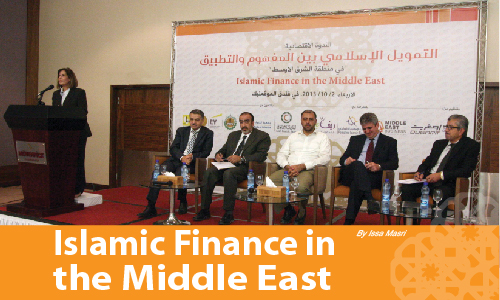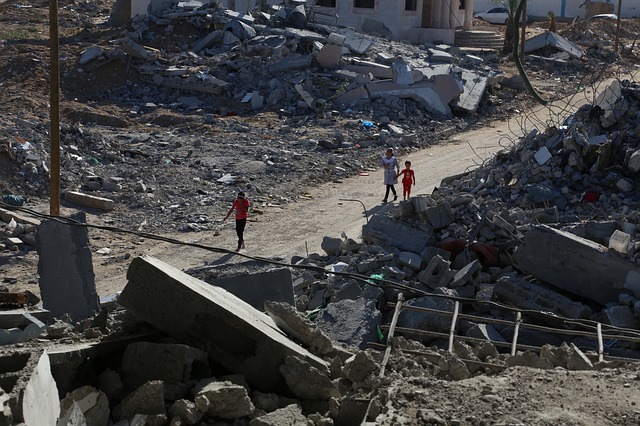Symposium:
Islamic Finance in the Middle East
Ougarit Group and Middle East Business magazine held a symposium in October entitled ‘Islamic finance: between theory and practice in the Middle East’, in partnership with Palestine Islamic Bank, Arab Islamic Bank and Reef microfinance.
Amal Masri, CEO of Ougarit Group and Middle East Business magazine’s Editor-in-Chief, stressed the importance of holding this symposium in the wake of the global credit crisis, a time during which many expected Islamic financing to constitute a solution to the global crisis. She said, ‘It was strange to find some protesters in Athens raising banners that demanded the implementation of Islamic banking instead of the conventional financial system, and this raises questions about their reasons for trusting the Islamic banking system’.
Banking awareness
In her opening remarks, Mrs Masri noted a significant increase in banking awareness amongst institutions and individuals, pointing out that figures and indicators reflected accelerated growth of the banking sector. She added, ‘Islamic banking constitutes a safe haven from business and investment risks, as Islamic banking assets in the Middle East exceeded $450 billion, and $1.5 trillion globally’.
Riyad Abu Shehadeh, Director of Inspection and Control Department at the Palestinian Monetary Authority (PMA), commended the performance of Islamic banks in Palestine, which international banking institutions consider more stable than conventional banks. He stressed the importance of enshrining principles of governance and strengthening internal controls and risk management systems saying, ‘PMA has compelled Islamic banks to appoint a Shari’a control commission (legal, from an Islamic point of view), identified mechanisms for their establishment and selection of members, to ensure banks’ compliance with the provisions and rules of Islamic Shari’a. They must also appoint a resident Shari’a controller, responsible for verifying the compliance of the bank’s management with Shari’a’.
Shari’a Control Commission
Abu Shehadeh indicated that PMA is currently working on establishing a higher Shari’a control commission for Islamic banks and lending institutions that practice Islamic financing, to review and issue Shari’a opinions (fatwas) and unify relevant provisions and rules.
Rami Taha, of Ernst &Young, said that more than 450 Islamic financial institutions operate globally, while the share of Islamic banks is less than 2% of the banking sector, indicating potential for developing Islamic banks. He added, ‘40% of the customers of Islamic banks in Malaysia are non-Muslims, which reveals that demand for this kind of bank is not restricted to Muslims’.
Quality shift
Sami Saidi, General Director of the Arab Islamic Bank, considered the risks that surround Islamic banks, especially in investment, require a quality shift in their risk management, adding that ‘Oversight of these risks must come from the central banks and the Monetary Authority, and this requires a re-consideration of the appropriate administrative structure at the Islamic bank to run all kinds of investments and trading, in comparison with conventional banks’.
Saidi believes that during the coming years, Islamic banking will grow significantly, but also proportionately and within the requirements of Islamic Shari’a and its tenets.
Dr. Ali Sartawi, member of the Control Commission at Palestine Islamic Bank, demanded that Islamic banks develop new investment means, rather than maintain the old methods, adding, ‘Islamic Shari’a did not specify forms of investment, but imposed general rules, making room for human creativity within these rules’.
Investment mechanisms
Sartawi indicated that the investment mechanism in Islamic banks is different from conventional banks, since according to Islamic banking if there is a loss, then the owner of the capital must bear it, while those who provide the expertise lose the value of their effort, unlike other economic systems in which the investor loses the effort, expertise and capital.
Reef microfinance is considered a successful model for Islamic financing, as its Director General indicated that ‘Palestine lacks insurance on agriculture, which requires further concentration on Islamic financing of the agriculture sector, such as Murabaha, which is linked to ownership’.
He added, ‘The agriculture sector faces the risks of price fluctuation, hence it is better to adopt a bulk purchase strategy which contributes to reducing costs’.
Reef uses the in-kind lending system utilising Islamic financing tools, and has financed the agriculture sector to the tune of $13 million over six years. Reef is ranked fourth among lending institutions in Palestine.
The rate of women borrowers at the Arab Islamic Bank amounts to 11% of the total number of borrowers, while 450 women currently borrow from Reef.
Islamic Finance Services
Bayan Qassem, adviser to the Palestine Islamic Bank, revealed that the Bank intended to establish an Islamic leasing (Ijara) company, in partnership with the Islamic Development Bank (IDB) and the Palestine Investment Fund (PIF), to meet the increasing demand for Islamic financing services. This new Islamic financing service in Palestine focuses on capital assets in the production process.
Mohamad Abu Awad, IDB’s Executive Officer in Jeddah (and its representative to Iraq, Syria, Lebanon, Palestine and Jordan), called for more support and media coverage for Islamic banks. He said, ‘Support for Islamic banking is poor, and the advertising of Islamic banking and financing needs improvement; hence, there is little demand for Islamic banks’. He stressed the importance of raising public awareness about Islamic banking services and tools, their operations, and how they comply with Islamic Shari’a through successful marketing campaigns.
Comprehensive symposiums
Khaled Masri, Chairman of Ougarit Group, stressed the importance of economic symposiums that include the private sector, decision makers, public institutions and the public at large, since they enhance their networking and create an economic partnership capable of advancing and progressing society and the economy.
Recommendations
In conclusion, the participants recommended raising awareness of Islamic banking through strengthening the media and marketing efforts to inform the public about Islamic banking services and tools.
The participants suggested the following:
-Islamic banks are transformed into comprehensive banking services – in practice rather than merely in theory – by providing a group of less costly and more diversified services,
-Expansion of Islamic banking activities to include all financing tools that are Shari’a compliant,
-Private sector involvement with the development of Islamic finance institutions, thus attracting individual investors by supporting them financially and morally.
The participants also called for expanding Islamic banking to include Islamic and non-Islamic countries, to create new forms of Shari’a compliant investments, to be innovative and provide statistics and studies about Islamic banking in Palestine.
It is worth noting that this symposium was held in cooperation with the Palestinian Banking Association, IDB (Islamic Development Bank), Ramallah Chamber of Commerce and Industry, Ernst &Young and Cyprus Chamber of Commerce. It was moderated by Dr. Barakat Qasrawi, Director General of Al-Quds Centre for Islamic Studies.

























